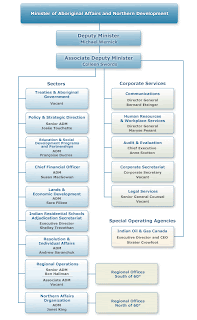Aboriginal
Rights in Canada
-->
social justice issue
-->
National Issue
The
government has made many piecemeal attempts to break hereditary cycles such as
poverty, domestic violence, health problems and lack of education, yet all
these problems stem from the same root meaning the aboriginals have not been
given proper aid that they deserve and are entitled to.
Non-aboriginals can clearly see now
that the treatment of these people is unequal. In our dark history, we have
selfishly taken their land and leaving them to forcibly relocate to reserves
with very poor living conditions sometimes resulting in death, or extreme
sickness. Shelter has become a momentous concern amongst
First Nations villages, because according
to 'INAC 2002' only 56.9% of their shelters were deemed passable around
1999-2000 meaning not needing major repairs. Even on the government funded
reserves, spending apparently 600 million dollars on it a year, they do not have
the money it would take to improve the standard of living out of what they call
"third-world" conditions. Overtime we, as a Canadian culture, have oppressed
their individual and unique cultural and traditions. If Canada would like to
rightfully promote the fact that we are a multicultural, accepting nation, we
should try to find a more tolerant and accommodating way to deal with the
issues surrounding the aboriginals instead of relying on assimilation.
Of course, there have
been treaties made between the Canadian aboriginal peoples and the government, but
the "Indian Act" only defines how those with an Indian status can
interact with the government of Canada.
“Canada is a test case for a grand notion —
the notion that dissimilar peoples can share lands, resources, power and dreams
while respecting and sustaining their differences. The story of Canada is the
story of many such peoples, trying and failing and trying again, to live
together in peace and harmony. But there cannot be peace or harmony unless
there is justice. It was to help restore justice to the relationship between
Aboriginal and non-Aboriginal people in Canada, and to propose practical
solutions to stubborn problems, that the Royal Commission on Aboriginal Peoples
(RCAP) was established.” — page ix, A Word From Commissioners found in a National
Post Article, full commission over 150 pages long.
This issue
is mostly a national issue, although can be viewed on a global level, as a lot
of other nations have faced or are facing similar issues. The aboriginals have always been careful,
sympathetic and nurturing with nature, animals and the planet as a whole, and
when Canadians and the government took away their right to protect that, we put
Canada in danger of more than just a social justice issue.
The
implications on the surrounding environment is more along the lines of 'what
could have been prevented' referring to destruction of habitats and endangering
species. Environmental impacts has been a
main issue for the aboriginal peoples, as well as cultural while the government
is mainly focused on the political and economic aspects. This has been an issue
since 1892, when Christopher Columbus sailed across the ocean blue and still is
a daily issue as of today. Before Canada was
even considered a country, Britain acknowledged that aboriginal had been living
here and therefore were entitled to land: the' Royal Proclamation of 1763' confirmed
that just the British could obtain property from the First Nations, and that
was normally done through treaties, which I previously mentioned.
There
are many indigenous right organizations working toward bettering and
strengthening the relationship between the aboriginal peoples and the Canadian government.


Emily Zych: The poor treatment of Canadian aboriginal peoples still rings true in current Canadian culture. Do you have any longterm suggestions/ideas of how to irradicate this descripency between the developed life of non-aboriginal Canadians and aboriginals? What can our government do to narrow this divide and erradicate native cultural stigmas? Almost half of all children in the Canadian foster care system are native. What does this say about the progress, or lack thereof, of the native people. Most importantly what dose this say about our government and social programs?
ReplyDeleteDear Emily,
DeleteThanks for taking your free time to read through my blog on something I am so passionate about! Your questions prove to me how much you understood the concept and ideas I was trying to convey in my post:)
Below my 600-700 word post, I left a list of NGOs relating to the treatment of Canadian Aboriginal peoples, and I as I am only a seventeen year old girl without a high school diploma as of yet, am not exactly able to personally make a huge difference by myself. Thankfully, I have all those NGOs to help us out to find more suitable permanent solutions to the injustice going on in our own country! All that we can hope to do .is show our support and awareness of their struggle. The government is already spending over 600 million dollars a year from our taxes to try and help the best they can to right the wrongs of our dark past. Our government is currently using piecemeal attempts to fix a problem that should be fixed as a whole, which is faulty and I did mention in my post. Other than that I cannot say much about what the government intends to do for the future as I am not on speaking terms with them. You may try and contact them yourself if you have any further questions relating to the way they run the country and handle the social issues that plague the nation.
---> Melissa Major, the author of this specific post, non-government member of society